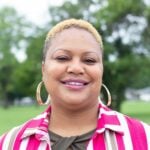It’s time Americans remove the victim-blaming veil covering our eyes and realize this country has created a system that is conducive to not only keeping people trapped in poverty but creating a group of second-class citizens.
“I was deeply concerned that people had a very flawed analysis of why so may people of color seem trapped in [the] so-called underclass, and the standard narrative goes something like this … poor people, particularly people of color, are trapped at the bottom because of failing schools, broken homes and drug addiction, and that if young men would pull their pants up and be fathers to their children, and if kids would just stay in school then this poverty problem would be solved,” said Michelle Alexander, New York Times best-selling author of “The New Jim Crow: Mass Incarceration in the Age of Colorblindness,” during an exclusive one-on-one interview with the Recorder. “That’s the standard story, and it was especially the standard story back in the late 1990s when I was working as a civil rights lawyer, representing victims of racial profiling and police brutality. And quite frankly, it’s a story that I bought back then. What I came to realize though is that millions of poor people, especially people of color, have been trapped in a permanent second-class status due to a literal war that has been declared on them.”
Alexander was the featured guest at Faith and Action Project’s fall event, “Poverty: Examining Roots, Working Toward Solutions,” Oct. 23 at Clowes Hall.
What Alexander discovered about poverty was it often wasn’t a choice — millions of Black people faced legal discrimination in housing, higher education, jobs and public assistance. A felony conviction — even nonviolent — often prohibited self-sufficiency.
“What people weren’t acknowledging is many of them were illegally barred from actually moving up and out of the conditions of which they lived,” Alexander said. “In Ohio, in my state, until relatively recently if you had a felony record you couldn’t get a license to be a barber, hundreds of jobs that were literally off limits to people who had felony records. I think part of what inspired me to write the book was that I felt the role of our criminal justice system was just missing from poverty conversations, and as important as it was for us to talk about failing schools and as serious as broken homes can be for young people as they’re struggling to make a way out of no way that ignoring the fact that millions of people were now legally barred from work and housing and access to higher education and even foods stamps, we were ignoring the so-called lower class had actually become in a few short decades a lower caste.”
Alexander said there must be a shift in the paradigm with how criminality and incarceration are viewed. For instance, she said, if adults are honest, they’ve committed an illegal act at some point in their lives. The difference is in who gets caught and who doesn’t.
“I think we’re at a place now where we’re going to have to overcome all of this condemnation and stigma that we’ve heaped upon those we view as criminals,” Alexander said. “I often say over and over again, we’re all criminals. If you’re an adult, at some point in your life you’ve broken the law. The criminals aren’t them. I’ve broken the law. When I was a young person, I drank underage, I experimented with drugs, I messed up, and I messed up over and over again … Yet, I was fortunate to live in a community where the police weren’t circling my block 24/7, and I didn’t get caught. I went on to college and I went on to law school just like millions of other people, who in their youth or at various points in their life, have made mistakes or struggled and fallen … We have got to, you know, if we’re going to overcome this system of mass incarceration, get over this us versus them mentality and think the criminals are somebody else.”
Changing our views on incarceration is possible, Alexander said, noting there’s a prison in Norway — which has a low incarceration rate and recidivism rate — located on a nature reserve on an island and prisoners learn to care for the land, animals and each other.
“We think that if we keep beating someone with the hammer it’s going to make them better, but we wouldn’t even treat a dog that way if you were trying to train a dog,” Alexander said. “So, I do think it requires a paradigm shift, and so are we committed to punishment or are we committed to making thriving healthy caring communities?”
While writing her book, Alexander discovered research from The Sentencing Project Executive Director Marc Mauer that found the most homogeneous countries have the most compassionate criminal justice and public welfare systems. On the other hand, the most diverse countries had the most punitive criminal justice and welfare systems.
For America, how we move forward in dealing with poverty and criminalization is now a moral and spiritual issue.
“I don’t think there’s any way we will ever end poverty in this country so long as the system of mass incarceration exists,” Alexander said. “It’s not possible if you’re locking people up and stripping them of basic civil and human rights.”
Contact Editor Oseye Boyd at 317-762-7850. Follow her on Twitter @oseye_boyd.







